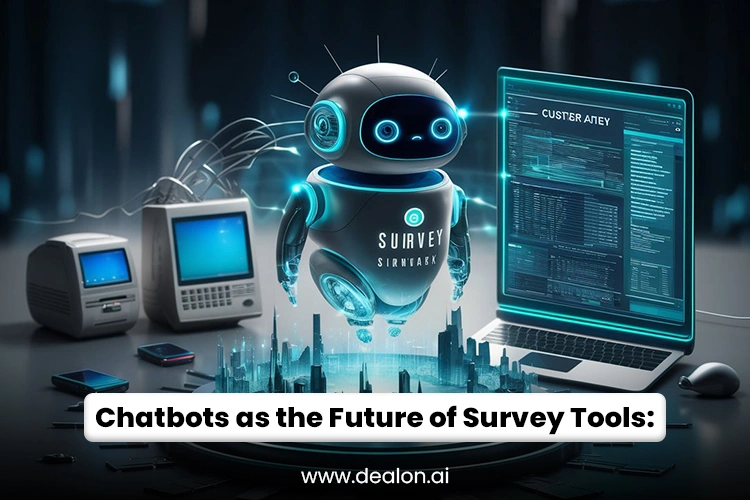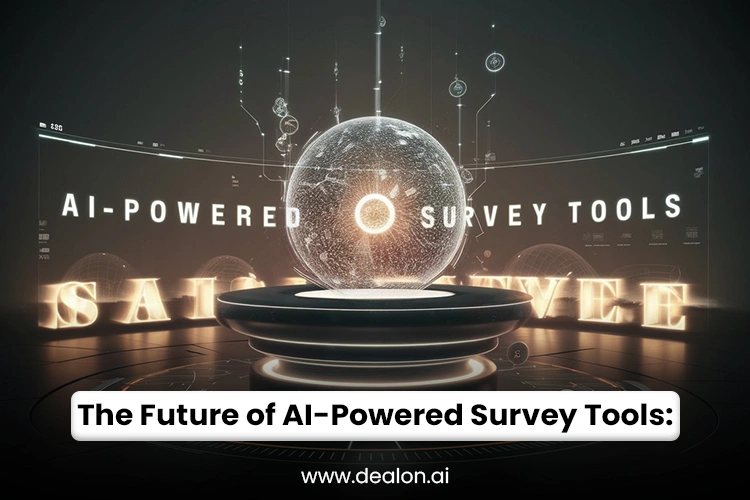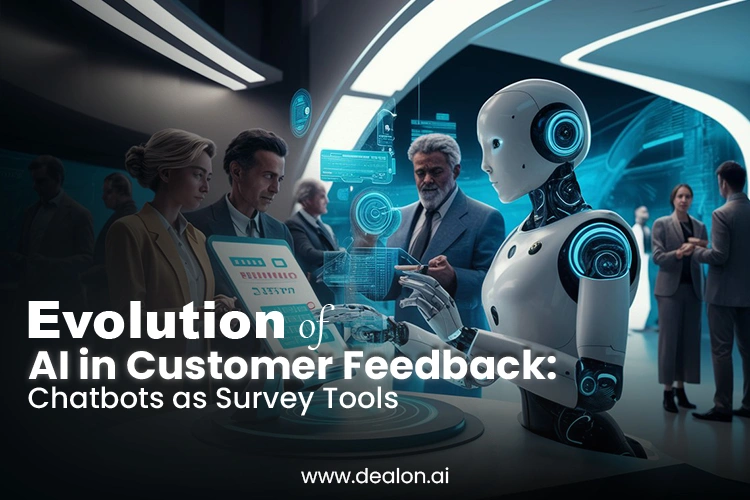Businesses are constantly pressured to stay ahead by refining their customer engagement strategies. One of the most transformative shifts in this domain is the seamless integration of artificial intelligence (AI) into customer feedback systems. With traditional methods such as phone surveys and focus groups often falling short of delivering timely, actionable insights, AI-powered solutions have risen to the occasion, reshaping how organizations gather and analyze consumer opinions.
Among these innovations, chatbots stand out as groundbreaking tools, offering unparalleled efficiency, personalization, and scalability. Chatbots have transcended their initial role as essential customer service agents, evolving into dynamic, AI-driven interfaces capable of conducting highly sophisticated real-time surveys. This technological leap allows businesses to collect feedback instantly, continuously, and from a broader spectrum of customers, ensuring more accurate and diverse data.
By mimicking natural human interaction, chatbots facilitate engaging, conversational surveys that encourage higher response rates, making them indispensable for businesses aiming to harness the full potential of consumer insights. As we navigate this transformation, we’ll examine how AI-driven chatbots reshape feedback mechanisms, enable more intelligent decision-making, and elevate customer experiences.
Read Also: 8 Practical Uses of AI for Streamlining Content Creation in Marketing
The Rise of AI in Customer Feedback

Customer feedback has long been a fundamental driver of business growth, enabling organizations to gauge satisfaction, identify pain points, and drive improvements. Traditional methods, such as phone calls and focus groups, have long been the go-to tools for this task. However, while effective, these methods often struggle with everyday issues: low response rates, delayed feedback, and a lack of ability to capture real-time sentiments. As a result, businesses usually face challenges in obtaining accurate, timely insights that can inform quick decision-making.
Enter artificial intelligence (AI)—a game-changing force revolutionizing how companies gather, analyze, and act upon customer feedback. With AI, feedback collection has transitioned from a static, time-consuming process to a dynamic, automated, and highly accurate system. Machine learning algorithms, in particular, are at the forefront of this transformation. These algorithms can now sift through vast amounts of data, identifying intricate patterns in customer behavior that were previously undetectable by human analysts.
Moreover, AI enables businesses to capture more diverse and representative feedback, overcoming the issue of low response rates. By utilizing NLP and sentiment analysis, AI-powered systems can interpret the emotional tone of customer responses, offering more profound insights into satisfaction levels and pain points. Rather than simply gathering numeric data, AI allows businesses to understand the context behind feedback, adding layers of meaning often lost in traditional survey responses.
Another critical advantage of AI in customer feedback is its capacity to predict customer needs and proactively engage consumers. Through predictive analytics, machine learning models can analyze past behavior and detect trends that suggest future preferences or concerns. For example, suppose a customer frequently experiences delays in a particular service. In that case, AI can identify this pattern and flag it for immediate attention, potentially even offering solutions before the issue becomes a more significant problem.
As AI technology evolves, its ability to deliver actionable insights with unprecedented speed and accuracy will only improve. What was once a reactive process—waiting for customers to provide feedback voluntarily—is now a proactive, continuous feedback loop that provides businesses with a constant stream of real-time data. This shift allows for more intelligent decision-making, targeted marketing efforts, and faster adaptation to changing consumer needs. As businesses embrace AI-driven feedback systems, they will increase their operational efficiency and enhance their ability to meet the ever-evolving expectations of today’s consumers.
Chatbots as the Future of Survey Tools

One of the primary challenges with traditional surveys—whether online or through other channels—is their ability to engage customers meaningfully. Standard surveys often come across as impersonal, monotonous, and sometimes even intrusive, causing respondents to lose interest or abandon the process altogether. In contrast, AI-powered chatbots provide a dynamic, conversational interface replicating natural dialogue. This shift from rigid survey formats to a more interactive and personalized experience is a game-changer in improving engagement and response rates.
The conversational nature of chatbots makes the survey process feel less like a task and more like an exchange between the customer and the brand. Whether through text-based chat or voice interactions, chatbots engage customers in a way that mirrors human conversation, creating a comfortable space for customers to share their feedback. This personalization is especially crucial in a digital age where consumers are inundated with surveys that lack relevance and human touch. By designing intelligent conversations tailored to the individual’s preferences or previous interactions, chatbots can encourage users to provide more honest and detailed responses.
Additionally, chatbots can be programmed to adapt to different customer moods, using tone and language that match the user’s style, further enhancing the overall experience. This adaptability results in higher customer participation rates, as respondents are likelier to engage with a system that feels intuitive and tailored to their needs.
Chatbots, on the other hand, can provide immediate feedback collection. Companies can capture feedback by initiating surveys or follow-up questions right after a customer interaction—whether it’s a purchase, a service inquiry, or a support request. At the same time, the experience is still fresh in the customer’s mind. This immediacy is invaluable for businesses seeking to understand customer sentiment in real time, particularly in fast-paced environments such as e-commerce or customer service.
Moreover, AI chatbots can engage customers in continuous conversations, encouraging them to provide insights at various touchpoints along their journey with the brand. Instead of relying on a single post-purchase survey, chatbots can gather feedback at multiple stages, from initial interest to post-purchase satisfaction, ensuring a comprehensive understanding of the customer experience. By enabling this real-time, ongoing feedback loop, companies can quickly adjust their products, services, or customer support offerings—leading to higher customer satisfaction and operational efficiency.
These advanced capabilities allow chatbots to categorize responses into specific themes, identify emerging trends, and highlight areas requiring immediate attention. For example, if a customer indicates dissatisfaction with a particular product feature, the chatbot can flag this feedback for review, prompting the business to investigate the issue further. Using AI algorithms, chatbots can also perform sentiment analysis—gauging the emotional tone behind customer responses.
By classifying feedback based on sentiment, chatbots empower businesses to prioritize actions based on urgency and impact. For example, a highly dissatisfied customer who reports a negative experience with customer service can be immediately flagged for follow-up, ensuring timely resolution and preventing churn. Additionally, AI-driven insights can inform data-driven decisions that lead to tangible improvements in products, services, and overall customer experience.
Furthermore, chatbots can synthesize customer feedback with other data sources—such as transactional data or browsing behavior—providing businesses with a more holistic view of the customer experience. By correlating survey responses with behavior patterns, companies can uncover more profound insights into customer preferences, pain points, and unmet needs.
The Benefits of Chatbots as Survey Tools
By automating the survey process, Chatbots drastically reduce the need for manual intervention and the costs associated with human labor. This automation allows businesses to gather high-quality, actionable insights without the overhead traditionally associated with feedback collection. For example, chatbots can simultaneously handle hundreds or even thousands of responses, analyzing and categorizing data in real time. This efficiency lowers operational costs and ensures businesses can scale their feedback efforts without increasing costs proportionally.
In a globalized, interconnected world, customer feedback doesn’t adhere to business hours. Customers from different time zones or those with irregular schedules may be unable to engage with feedback surveys during conventional office hours, resulting in missed opportunities for valuable insights. Chatbots eliminate this challenge by offering round-the-clock availability, allowing customers to share their opinions conveniently.
Moreover, the accessibility of chatbots extends beyond geographical and temporal boundaries. Whether a customer is based in New York, London, or Tokyo, chatbots can be deployed to engage them in their preferred language, making it easier to collect feedback from a wide range of customers without the need for complex manual interventions. This accessibility fosters inclusivity, ensuring that no voice goes unheard and that businesses comprehensively understand their global customer base.
A significant advantage of AI-powered chatbots is their ability to deliver a highly personalized experience during the survey process. Traditional surveys often rely on one-size-fits-all questions, leading to generalized responses that may not provide deep insights into customer experiences or expectations. Chatbots, conversely, can tailor survey questions to each individual based on prior interactions, purchase history, or service usage, creating a more relevant and customized feedback experience.
Additionally, chatbots can adapt the tone and language of their interactions to match the customer’s preferences. A formal tone might be used with business clients, while a more casual and friendly approach could be taken with younger consumers. Chatbots foster stronger emotional connections by replicating a personalized interaction that mirrors customer communication styles, enhancing customer satisfaction and loyalty.
This level of personalization leads to more precise and meaningful data and strengthens the relationship between businesses and their customers. Customers who feel that their feedback is genuinely valued are more likely to return, contribute additional insights, and develop a more profound sense of brand loyalty.
Another remarkable benefit of using chatbots as survey tools is their real-time data processing. Traditional survey methods often involve time-consuming manual data entry and analysis, which can delay the identification of trends and emerging issues. Chatbots, however, can analyze responses instantly, providing businesses with actionable insights within moments of feedback collection.
Chatbots can use AI and machine learning algorithms to categorize responses, identify patterns, and highlight urgent concerns. For instance, if a chatbot detects a series of adverse reactions related to a particular product feature, it can immediately flag these issues for review by the relevant team. This proactive approach allows businesses to address potential problems before they escalate, improving customer satisfaction and minimizing the risk of negative reviews or lost business.
The Future of AI-Powered Survey Tools

The future of AI-powered survey tools holds immense promise as advancements in artificial intelligence redefine how businesses collect and leverage customer feedback. As AI technology evolves, chatbots are set to become even more integral to the survey process, delivering even richer insights and driving a more sophisticated, seamless experience for customers. Below, we explore the exciting developments on the horizon that will enhance the functionality and precision of AI chatbots in the realm of survey tools.
One of the most significant developments in the future of AI-powered surveys will be the integration of chatbots with voice assistants like Amazon Alexa, Google Assistant, and Apple’s Siri. These voice-activated platforms are rapidly becoming central to how people interact with technology in everyday life. As businesses seek to create more hands-free, accessible feedback experiences, AI chatbots will likely work with voice assistants to gather survey responses.
Voice-powered surveys allow customers to participate in feedback processes without needing text-based input, making surveys more accessible to a broader audience. For instance, customers could respond to questions simply by speaking, allowing for a more natural and effortless interaction. This integration could be particularly valuable for businesses aiming to gather feedback in environments where typing is impractical, such as in-store or during product use.
With more sophisticated voice recognition and AI-driven analysis, voice-activated surveys will collect data and interpret spoken responses’ tone, sentiment, and nuance. This would enable companies to capture more contextual feedback, which would be invaluable for understanding customer emotions, preferences, and attitudes in real time.
Natural Language Processing (NLP) has revolutionized how AI chatbots interpret and respond to human language. Still, future developments promise to make chatbots even more adept at understanding the intricacies of human communication. NLP will evolve to process more complex sentence structures, dialects, and slang, ensuring that chatbots can comprehend diverse forms of expression.
Additionally, improved NLP will allow chatbots to handle more sophisticated, multi-layered questions. Instead of asking simple yes/no questions or basic multiple-choice options, chatbots could engage customers in dynamic, open-ended dialogues that encourage more thoughtful responses. This evolution will enrich the feedback collection process, resulting in higher-quality data that reflects customer needs.
AI-powered survey tools of the future will incorporate enhanced predictive analytics, enabling businesses to anticipate customer needs based on historical feedback data and emerging trends. Predictive analytics will allow chatbots to identify patterns in customer responses and forecast future behaviors, such as potential product preferences or service expectations.
For instance, imagine a chatbot that asks customers for their feedback and uses previous interactions to predict the questions that might be most relevant to each individual. By customizing survey questions based on customer history, AI will create a highly personalized experience that feels more intuitive and aligned with each customer’s unique journey.
These predictive capabilities will help businesses make faster, more informed decisions. For example, if a customer mentions dissatisfaction with a specific feature, the AI chatbot could instantly predict which other aspects of the product or service may require attention, allowing businesses to address issues proactively and prevent customer churn.
AI chatbots are poised to tackle increasingly complex survey structures with ease. Today, many surveys consist of multi-step questions, requiring customers to navigate through a sequence of queries. As AI technology advances, chatbots can guide users through complex surveys seamlessly and intuitively, making it easier for customers to complete surveys without feeling overwhelmed or disengaged.
The enhanced user experience will increase completion rates as chatbots adapt their questioning strategies based on real-time responses. For example, suppose a customer provides a negative rating for a service. In that case, the chatbot can automatically adjust subsequent questions to delve deeper into specific pain points, ensuring that the business captures the most valuable feedback.
Simultaneously, businesses will gain access to instant results, allowing them to analyze responses in real time and make immediate, data-driven decisions. The combination of faster feedback collection and instant analysis will empower companies to adapt quickly, improving customer satisfaction and optimizing service offerings on the fly.
Conclusion
From the early days of basic surveys to today’s sophisticated AI-driven interactions, chatbots have revolutionized how feedback is collected, analyzed, and acted upon. Their seamless, conversational interface ensures a more engaging and personalized experience, encouraging higher response rates and more accurate insights.
As AI technology advances, we can expect chatbots to become even more integrated with voice assistants, capable of processing complex natural language and powered by predictive analytics that drive personalization. These advancements will enable businesses to capture more profound, nuanced real-time feedback, empowering them to swiftly make informed, data-driven decisions.
The benefits of using chatbots as survey tools are clear—cost efficiency, 24/7 availability, and the ability to provide tailored experiences. Ultimately, AI-powered survey tools transform customer feedback into an indispensable resource for continuous improvement. As AI advances, businesses will gain increasingly powerful tools to improve customer satisfaction, predict needs, and adapt their offerings to keep up with the dynamic market demands.

